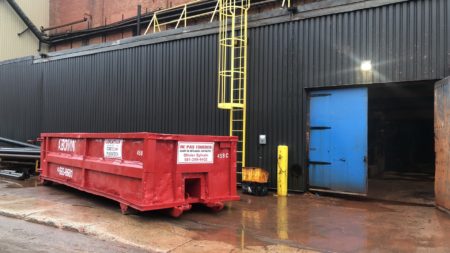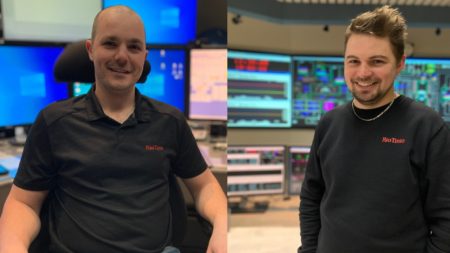KYK Visit: Radio DJs Get the Operator Experience
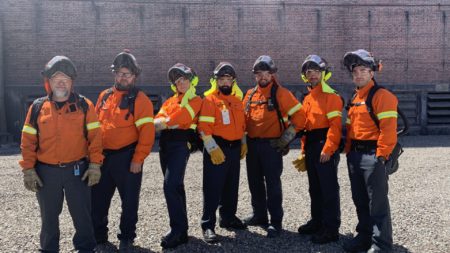
This past May, three DJs from radio station 95.7 KYK stepped out from behind the microphone and into Rio Tinto uniforms. Dominick Fortin, Martin-Thomas Côté and Tania Clouston were challenged by listener Jean-Nicolas Desbiens, a plant employee, to spend a few hours experiencing the life of an operator. On 31 May, the three colleagues made their way to Potroom 45 at Arvida Works’ West Smelter Centre (WSC) for an immersive and unforgettable experience!
“The visit was very enlightening! […] We were really in the thick of it,” said Dominick as he thanked Jean-Nicolas for initiating the meet-up.
Several months prior, the Rio Tinto employee had been listening to some on-air commentary that gave him the idea to contact the DJs. “It’s not so easy, what we do!” said Jean-Nicolas. “I thought, why not invite them to the plant to debunk some of the preconceived notions […] about our work?”
Several months, multiple meetings and—due to the pandemic—quite a few unforeseen delays later, the plan was hatched. “The organisation was very open to showing people what we do,” he continued. “Very few people get to see that.” Upon arrival, the three intrepid DJs met with Jean-François Leblanc, General Manager of the plant, who presented the facilities to them.
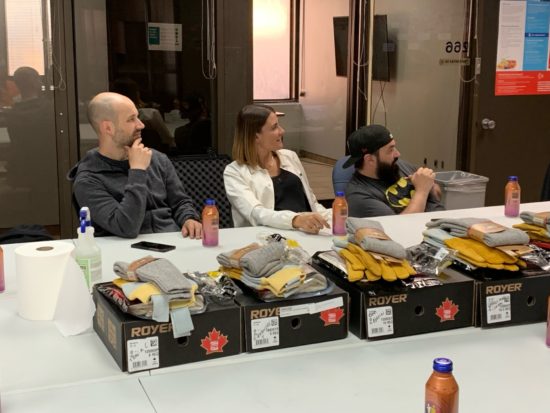
After some deliberation, Potroom 45 was selected to host the visitors. Located at the end of the WSC, the site was deemed a suitable place to welcome the apprentice operators. “We went a little easy on you!” explained Jean-Nicolas. “In terms of temperature and air, it’s easier. And for the work itself, we planned it so that there would be enough space to do the tasks and enough time to see it all. As you saw, it’s quite tight. There isn’t much room for improvisation in an industrial environment like ours.”
The DJs were amazed by the welcome that they received. Martin-Thomas commented, “I was expecting us to be put on a bus and taken around the pots without touching anything, but I was surprised at the number of tasks we were able to do. We really got a hands-on experience.”
As the DJs learned, the tasks involved in the operations are more complex than they seem: the potroom contains no less than 68 pots, all under the operator’s responsibility. For the visit, Martin-Thomas was given the physically demanding task of keeping the area clean and tidy.
Much to his colleagues’ amusement, the DJ found himself struggling to maintain control of the brush. “I was fighting against the pot and the magnetic pull. I was dealing with heat and an unknown environment.”
Dominick was impressed by the dexterity required for an anode change. The group observed as two such operations were carried out. Jean-Nicolas put things in perspective by informing the DJs that all 68 anodes need to be changed in the course of a shift. Depending on which potroom the worker is in, the task may require climbing up onto the pots to open the panels manually. Environment, heat, repetition and time are all factors that complicate the tasks.
Meanwhile, Tania worked on scraping down a pot to get the siphoning holes ready. “My job was relatively easy,” she said. “I only did five, so that was fine, but real siphoners have to do up to 100. The temperature and the repetition were the biggest challenges for me.”
The once-in-a-lifetime visit also featured crane and suspension lifting operations.
The operators-for-a-day got to witness the vital role of occupational health and safety, saying that operations are thoroughly supported and well planned despite tight ergonomic constraints. “Everyone is on task, everyone follows lockout procedures and wears a badge when working in certain zones,” said Dominick. “I would imagine that, even though it’s a complex environment, you must still feel quite safe.”
“Yes, absolutely,” answered Jean-Nicolas. “We see our health and safety advisors regularly. We always take it very seriously. There is a high level of co-activity, [so] we have no choice but to be vigilant to minimise risk and get the job done safely.”
Though the DJs are in no hurry to hang up their microphones for a change of career, all three acknowledged the highly competitive working conditions at Rio Tinto. Dominick jokingly wondered aloud whether he had the endurance to make it as an operator, to which his amused colleagues responded doubtfully.
But the next generation is already coming up fast. Jean-Nicolas concludes, “The guys all talk and help each other out. It goes with the generation, I think. It’s nice to have such a dynamic, close-knit team.”
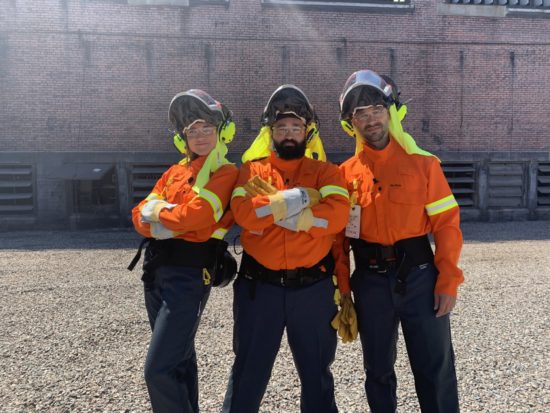
Though the DJs are in no hurry to hang up their microphones for a change of career, all three acknowledged the highly competitive working conditions at Rio Tinto.

